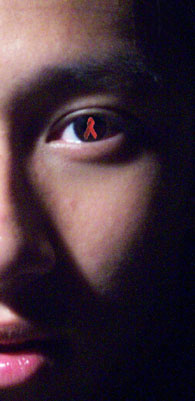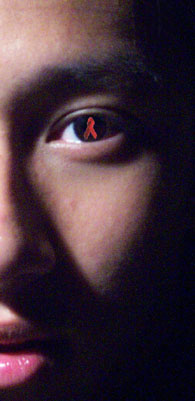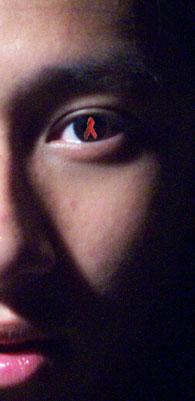"I have something to tell you. I'm beginning to really like you and if you're going to leave, I want you to leave now. I'm HIV-positive."

I had always known that HIV or AIDS would touch my life in one way or another. Eight years ago I penned Singapore's first 'gay novel'. In the story, which I self-consciously declared non-autobiographical, the protagonist loses his partner to AIDS and departs for a new life as a university student in London. A year later I wrote a short story for an anthology that was placed alongside a review of the novel. That tale is based loosely on a gay couple who had read the novel and whom I had met when I was on holiday in Singapore. In it one of them dies of AIDS. So there was a sense of a poetic, yet twisted, irony to the fact that in real life, the man with whom I fell in love in London when I was twenty-six, was HIV-positive.
While I can clearly remember Ricky telling me that he was positive, I cannot for the life of me recall what my exact response was. Whatever it was, the fact is that I did not leave - well, not straightaway anyway. The revelation came in 1996, about three weeks after we met. But it was a year before doubt and confusion struck. Without the conventional trappings of matrimony and parenthood, gay relationships inevitably reach a point which can probably be described as the 'What now?' juncture. For me this came after twelve months, and when the implications of having a 'partner' as opposed to a 'boyfriend' with HIV really hit me for the first time. My first instinct was to head towards the exit sign. So we parted ways. But a week later I was at his door again, my unfounded fears allayed, convinced that I loved him in a way that even the spectre of AIDS could not deter.
Maybe I love being a drama queen. Maybe I am a sucker for victimhood. Maybe. But nothing could detract me from my belief that I really did want to be with Ricky for a long, long time. I used to say that I wanted to spend my life with him. But his response would always be, "You mean you want to spend the rest of my life with me." So now I avoid any references to lifetimes. It's not fair and more importantly it's not relevant. The richness that Ricky brings to my life is immeasurable and invaluable. Sometimes I see it in terms of his constant warm, reassuring, supportive presence, whether physically or in my mind. Sometimes I view it through an imaginary camera lens; unframed snapshots of mundane images that warm my heart - him kissing me goodnight, him ironing my shirt in the morning, him cleaning his ears in the bath, him on the sofa snoring with the two purring cats resting on his chest.
Following that break-up and make-up came two key events in our lives. First, I managed to persuade Ricky to start on a course of combination drug therapy. This was no easy task and he only came round to the idea after weeks of discussion and argument. While I was determined not to let HIV become more of an issue than it could have been, I was quite clear as to what Ricky's status meant to me. I would support him through whatever resulted from the virus - there was no doubt about that. But to me, it was vital that he gave himself a fighting chance. We knew, even then, that it was a matter of time before HIV, if left untreated, would develop into the medical condition that is AIDS, unless the infected person was a 'natural non-responder'. I remember the doctor telling us that the chances of being a 'natural non-responder' were very slim, but I forget the odds.

I remember us wading through medical journals and magazines and I specifically recall one leading article that fundamentally changed the way we looked at things. It described HIV as a 'chronic manageable disease, not unlike diabetes'. With these words came a sense of enlightenment and optimism, and since then I no longer link HIV inextricably with death. I believe that it is the impressive success rate of combination therapy (in countries where they are available and affordable) that has led to the increasing use of the phrase 'living with HIV' as opposed to 'infected with HIV' or 'afflicted by AIDS'.
The second milestone in our relationship came a month or so after he began his treatment. On a clear, bright and warm day in early autumn, we sealed our commitment to each other in an intimate union service in a Unitarian chapel in the leafy London suburb of Hampstead. It was attended by a hundred or so friends and loved ones. I can say without any fear of contrived sentimentality that it was one of the happiest days of my life. We were apprehensive at first, not because of doubts over our feelings for each other, but because of what we thought people might think. My worst fear was that the ceremony might be construed by cynics as a convenient union of an HIV-positive person seeking security and a foreigner grasping at the chance of UK residency status amidst the then-ambiguous immigration rules regarding same-sex couples. In hindsight, those doubts were an injustice to our friends.
The early days of treatment were tough - a test of will for Ricky which he came close to failing on more than one occasion. Finding the combination that works for a patient is a matter of trial and error. Success is measured not just in terms of T-cell count and viral load level but also in terms of the side effects. During the most trying periods of experimentation, Ricky had to endure nausea, vomiting, loss of appetite, loss of concentration, and a host of other less debilitating but equally frustrating side effects. Over the last three years, Ricky has been through five variations in his combination. The current one has worked well without side effects for more than a year; his T-cell count is healthy and viral load below detectable levels. With confidence in continued advancement in HIV drug development and the good fortune of being in a First World country with a National Health Service that provides free treatment, we are ever hopeful that the future remains bright.

I just realised that I have made no mention of how Ricky contracted the virus. Not surprising, considering that I have always regarded the issue of how it was contracted as being completely irrelevant to us and to our future. It is easy to forget sometimes that the virus is a part of our lives. There are days when, despite my devotion, I can't even remember the names of the protease inhibitors in Ricky's combination. Then there are times when we are cruelly reminded, like the one instance when the condom ripped and even in the palest of moonlight, I could see the blood drain from his face. But so far we have managed to overcome each obstacle that has come our way. For now at least, our relationship and our day-to-day existence has transcended the HIV issue.
When asked for a few lines on Worlds Aids Day, I am in a dilemma. I feel obliged to give the expected spin on issues such as commemoration, education, research, funding and the plight of Third World victims. But my reality says all I can do is see this as an account of personal experience. Looking beyond the statistics and the red ribbons, and despite my sincere belief in, awareness of, and support for all the things that the day stands for, December 1 is no more significant to me, or to Ricky, than any other day of the year. Perhaps, for us, this is an inevitable consequence of 'living with HIV'.











 Printable Version
Printable Version









